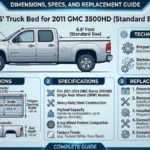Thanks to improvements in technology, modern car engines are more potent and efficient than ever before. More power means more responsibility for maintaining a dependable and efficient engine. The oil pressure sensor is an integral part of the engine’s health monitoring system. In this piece, we’ll delve into the relevance of oil pressure sensors, how they work, and the vital role they serve in protecting today’s engines.
What is an Oil Pressure Sensor
One of the most important components of an automobile’s ECU is the oil pressure sensor, often known as an oil pressure sender or switch. Its principal function is to send real-time information to the vehicle’s onboard computer (ECU or engine control unit) about the oil pressure within the engine. The sensor is a crucial safety feature that prevents engine harm from low oil pressure.
Functioning of Oil Pressure Sensors
There isn’t much to explaining how the oil pressure sensor works. A diaphragm or miniature piston that moves in reaction to shifts in oil pressure is a common component. The oil pump is responsible for pumping oil around the engine to keep everything well-lubricated and cool. This oil’s pressure shifts in response to how hard the engine is working.
The oil pressure sensor monitors the pressure within the engine and communicates this information to the engine control unit (ECU) when everything is working well. The ECU takes this data and uses it to regulate things like fuel injection, ignition timing, and overall engine output. If the oil pressure drops below the safe level, the sensor will quickly alert the driver by lighting up the oil pressure gauge or flashing a light on the dashboard.
Significance of Oil Pressure Sensors
- Engine Safety and Longevity: If you want to keep your engine running smoothly and reliably for a long time, it’s important to keep the oil pressure up. Lack of lubrication can accelerate engine wear, necessitating more frequent maintenance and potentially increasing the cost of repairs. The oil pressure sensor is useful since it alerts drivers to any problems quickly so they may take preventative measures.
- Preventing Engine Damage: Reducing the Risk of Engine Damage Low oil pressure can be caused by a number of issues, including low oil levels, a faulty oil pump, or oil leaks. If not fixed right away, it can lead to expensive repairs or perhaps a complete engine replacement down the road. The sensor plays the role of a safety net, sounding an alarm and encouraging the driver to take corrective action if the oil pressure drops below a predetermined threshold.
- Enhanced Vehicle Performance: Better Fuel Economy and Fewer Emissions Better performance, fuel economy, and emissions are all benefits of keeping oil pressure at the recommended levels. The oil pressure sensor is an essential component in ensuring the longevity and efficiency of the vehicle’s engine.
- Diagnostic Capabilities: Modern automobiles’ on-board diagnostics systems would be incomplete without oil pressure sensors. When hooked up to a scan instrument, mechanics can get precise engine trouble diagnoses based on real-time oil pressure data.
Conclusion
Overall, it’s safe to say that engine management systems today simply couldn’t function without oil pressure sensors. They are vital in preventing harm to the engine by constantly checking oil pressure and delivering feedback in real time. By monitoring lubricant levels and alerting the driver to any problems, these sensors help improve the vehicle’s efficiency, durability, and dependability. Keeping up with routine maintenance and monitoring oil pressure readings is key to maximizing your engine’s lifespan and minimizing the need for expensive repairs.











